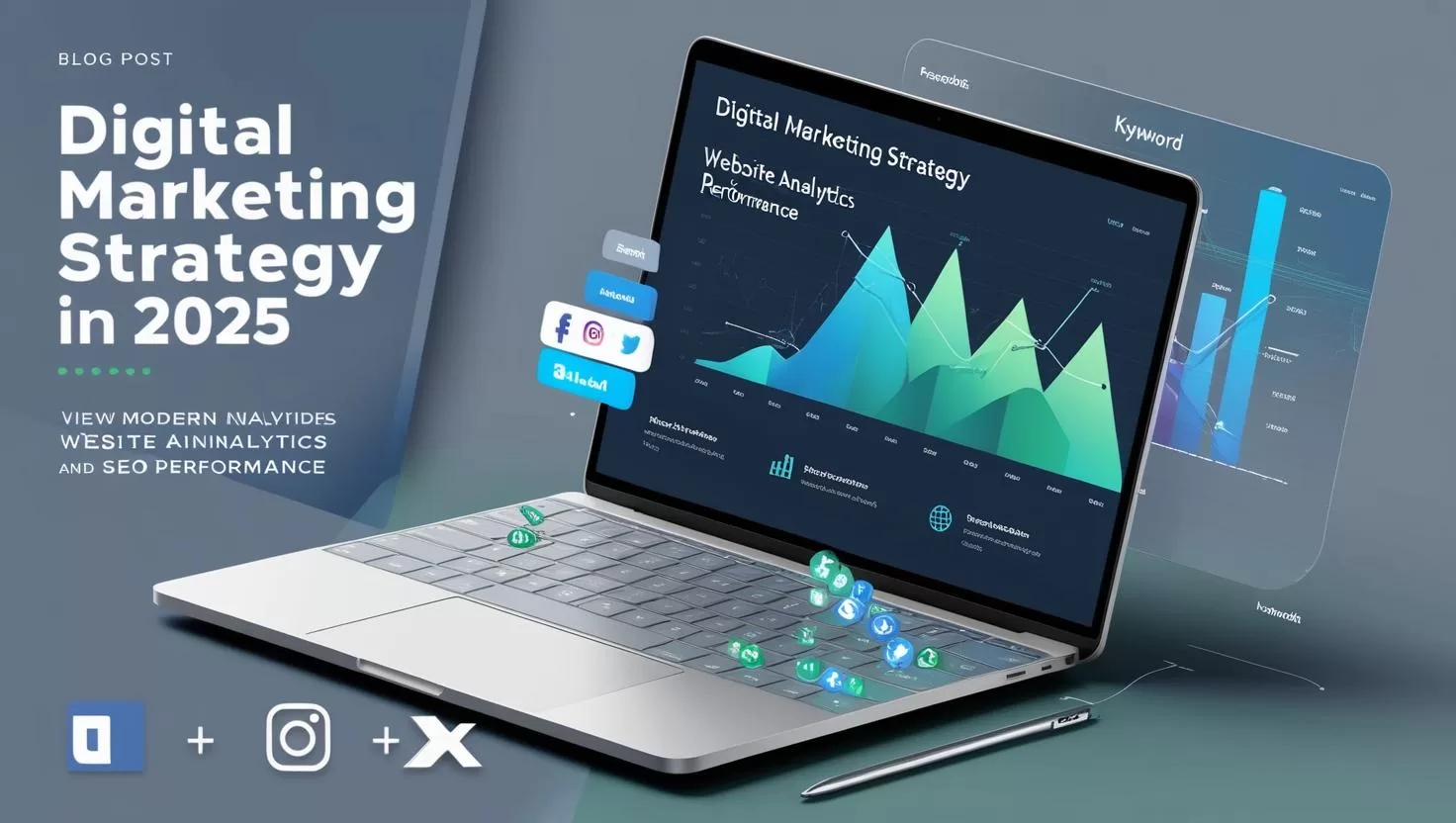
Introduction
In today’s fast-paced world, a robust digital marketing strategy is essential for businesses that want to stay ahead of the competition. As we move into 2025, digital marketing is evolving rapidly, with new technologies and consumer behaviors shaping the way brands connect with their audiences. So, what exactly is a digital marketing strategy, and why is it so important?
A digital marketing strategy is a plan that helps businesses use digital channels like websites, social media, email, and search engines to promote their products or services. It’s a comprehensive approach that considers everything from brand visibility to customer retention. In 2025, having a well-crafted digital marketing strategy is more crucial than ever for businesses to thrive.
The Foundation of a Solid Digital Marketing Strategy
To create an effective strategy, the first step is understanding your target audience. Knowing who they are, what they care about, and how they behave online is key. Additionally, analyzing market trends and setting clear, measurable goals will keep your efforts focused and aligned with your overall business objectives.
- Understanding Your Target Audience
Knowing your customers' needs and pain points allows you to create tailored marketing messages. Use data analytics tools to understand customer demographics, preferences, and behavior. - Analyzing Market Trends
Stay up-to-date with the latest digital trends. Whether it’s the rise of AI or shifts in social media engagement, knowing the market landscape can help you make informed decisions. - Setting Clear Goals and KPIs
What do you hope to achieve with your digital marketing strategy? Set clear, measurable objectives, such as increasing website traffic, improving conversion rates, or boosting brand awareness.
Developing Your Digital Marketing Plan
With a strong foundation, it’s time to craft your plan. Your digital marketing efforts should span across multiple channels, each playing a unique role in achieving your goals.
- Identifying Core Channels: SEO, SEM, Social Media
Decide which channels best suit your business. Search Engine Optimization (SEO) and Search Engine Marketing (SEM) help drive organic and paid traffic, while social media marketing connects your brand with your audience. - Budgeting and Resource Allocation
Allocate resources wisely. A successful digital marketing strategy requires investing in tools, advertising, and human resources, so set a budget that reflects your goals.
Building a Strong Online Presence
A strong online presence is at the heart of any digital marketing strategy. This includes optimizing your website, ensuring it’s user-friendly, and crafting a content strategy that engages visitors and encourages them to convert into customers.
- Website Optimization and User Experience
Your website is often the first point of contact with potential customers. Make sure it’s fast, mobile-friendly, and easy to navigate. - Content Strategy for Engagement
Content is king. From blog posts to videos, your content should inform, entertain, and persuade your audience to take action.
SEO: The Backbone of Digital Marketing
SEO is one of the most important components of a digital marketing strategy. Without proper SEO, even the best content may not get seen. Focus on:
- On-Page SEO
This includes optimizing your web pages with relevant keywords, improving page titles and meta descriptions, and ensuring proper header tags. - Off-Page SEO
Build backlinks, improve your site’s authority, and engage in social media sharing to boost your site’s credibility. - Technical SEO
Make sure your website is easily crawlable by search engines and free from technical issues that could affect its ranking.
Pay-Per-Click (PPC) Advertising
PPC is a paid advertising strategy that can drive immediate traffic to your website. While it requires investment, the ROI can be substantial if done correctly.
- The Role of PPC in Digital Marketing
PPC ads, such as Google Ads or social media ads, allow you to target specific keywords and demographics. It’s perfect for businesses looking to generate leads quickly. - Creating Effective PPC Campaigns
Craft ads that speak directly to your target audience. Use compelling copy, precise targeting, and proper budget allocation to optimize your campaigns.
Social Media Marketing: Connecting with Your Audience
Social media platforms like Facebook, Instagram, and LinkedIn are ideal for engaging with your audience on a personal level.
- Choosing the Right Platforms
Not all platforms will work for every business. Choose the ones where your target audience spends their time. - Crafting Engaging Content
Post regularly, engage with your followers, and use multimedia (images, videos, polls) to keep your audience interested.
Email Marketing: A Direct Line to Your Customers
Email marketing remains one of the most powerful tools for building relationships with your audience.
- Building Your Email List
Use lead magnets, sign-up forms, and exclusive offers to grow your email list. - Creating High-Impact Email Campaigns
Send personalized, relevant content to your subscribers. Segment your list to ensure your messages resonate with different customer groups.
Influencer Marketing: Leveraging Third-Party Trust
Partnering with influencers can help amplify your brand’s message.
- Finding the Right Influencers
Choose influencers whose audience aligns with your target market. - Developing Effective Partnerships
Work with influencers to create authentic content that resonates with their followers and builds brand trust.
Analytics and Performance Measurement
To know if your digital marketing strategy is working, you must measure performance regularly.
- Using Google Analytics and Other Tools
Google Analytics, social media insights, and email marketing platforms offer valuable data on your campaigns’ effectiveness. - Iterating Based on Data Insights
Use the data to tweak your strategies and improve your campaigns over time.
The Importance of Adaptability in Digital Marketing
The digital landscape is constantly changing. Staying flexible and being open to new trends and technologies is essential for long-term success.
- Staying Current with Trends and Technologies
From AI tools to new social media platforms, make sure you stay ahead of the curve. - Adapting to Consumer Behavior Changes
Monitor shifts in consumer preferences and adjust your strategy accordingly.
AI and Automation in Digital Marketing
In 2025, AI and automation will play an even larger role in streamlining processes and optimizing campaigns.
- Benefits of AI Integration
AI can help with personalization, chatbots, and predictive analytics to improve customer experiences. - How Automation Improves Campaign Efficiency
Automating repetitive tasks like email follow-ups or social media posting saves time and ensures consistency.
Case Studies: Successful Digital Marketing Campaigns
Look at successful campaigns from top brands to learn what works. From Nike to small businesses, studying their strategies can provide key insights.
Common Mistakes to Avoid
To avoid pitfalls, steer clear of these common digital marketing mistakes:
- Overlooking Mobile Optimization
Many consumers browse and shop on mobile devices, so your website must be mobile-friendly. - Ignoring Data Analytics
Failing to analyze performance data means missing out on opportunities for improvement. - Failing to Adapt to Changes
Don’t rely on old tactics. Digital marketing is constantly evolving.
Conclusion
In 2025, a comprehensive and adaptable digital marketing strategy is more important than ever. By focusing on the key elements outlined in this article, businesses can stay competitive and effectively engage with their target audience. Whether it’s through SEO, social media, or AI-driven tools, the future of digital marketing is bright for those who are ready to embrace change.
FAQs:
- What are the key elements of a digital marketing strategy?
The key elements include understanding your audience, setting clear goals, selecting the right channels, and utilizing SEO, PPC, social media, and content marketing. - Why is SEO important in digital marketing?
SEO helps improve your website’s visibility on search engines, driving organic traffic and boosting brand authority. - How can I improve my social media marketing strategy?
Focus on engaging content, choosing the right platforms, and consistently interacting with your audience. - What is PPC advertising, and how does it work?
PPC is a paid advertising model where you pay for each click on your ad. It helps generate immediate traffic. - How can AI and automation help my digital marketing strategy?
AI can optimize customer experiences, while automation can save time on repetitive tasks, improving efficiency.
We’d love to help—contact us here to get expert support tailored to your business.
